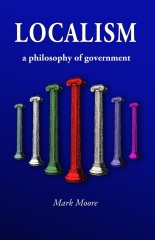Wednesday, October 1, 2014
Beyond Ron Paul on Secession
Ron Paul wrote an article yesterday in which he found encouragement in the recent vote on succession in Scotland and the growth of such movements in general. The Good Doctor sees such movements as the key to making government smaller and more decentralized. Of course Paul has always been a fan of making relationships, such as the one between a state and the central government, voluntary rather than compulsory. There is nothing really new in his position.
I am not sure that much of the media covering Dr. Paul really understands his position, or is even interested in understanding it. Does he want Texas to secede from the union? I doubt it, but he does want the federal government to respect both the limits set for it in the constitution and the states which comprise the union. Right now, it respects neither. And the reason it respects neither is because there are no consequences for it when FEDGOV disrespects them. FEDGOV takes the position that its own employees (federal judges) are the final arbiters of the limits of the power of their employers. Rather than find Dr. Paul's position radical, a fair and unbiased media might give more examination to the radical position assumed by our own federal government.
Without consequences for trampling on the constitution, FEDGOV will in time trample on the constitution. Without consequences for treating the states with disrespect, FEDGOV will in time treat the states with disrespect. Secession is not the first option. It is not something desired of itself. Its like a safety valve, something created in the hopes that it will never have to be used. A safety valve is not a part of the primary function of a system, but it helps keep the system within workable parameters. Its is not there to destroy the system, but rather by its presence prevent the system from destroying itself. That is how the right to secede would function.
That is how it just did function in Scotland. Dr. Paul rejoices that Britain granted Scotland more local control as part of the effort to induce them to stay in Great Britain. Brining control closer to the individual, making relationships voluntary instead of compulsory. Those are the things Dr. Paul was celebrating.
I myself have no interest in secession. I think America is much better together than apart, but by "America" I mean the people of the nation, not the federal government. At this point, we would be better off with a central government so much smaller and less intrusive that it would not be recognizable by any of the ruling class in Washington. Secession would only be in desirable as a safety valve. It would only be a last resort if Washington insisted on continuing with implacable ruthlessness its policies which gather all power unto itself.
The second of the seven pillars of localism is that there must be remedies by smaller governments against more central governments when they violate the compact which bound them together. I think Dr. Paul is overly optimistic when he says that breaking into smaller and smaller states alone would bring more liberty and variety of currency. To stop power from recentralizing each of the seven pillars of localism must be attended to. Small states can fall prey to large ones. We need a system of government which combines the protections and advantages of being large with a way to ensure political power is and stays decentralized and in reach of the individual. Localism is that system.
In the end, it is either going to be localism or globalism. The reason is simple: other less complete philosophies of government cannot protect their citizens from the various means by which centralizers consolidate power. Secession is an important component of this process of decentralizing power, but as a safety valve, not a primary function.
Subscribe to:
Post Comments (Atom)

No comments:
Post a Comment